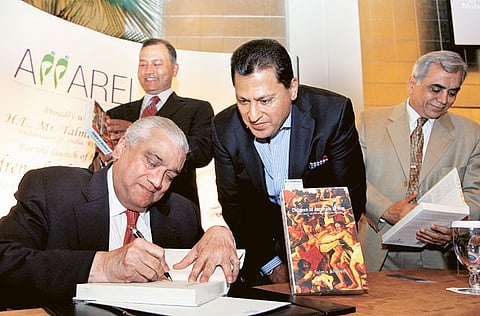A need to fight ignorance
Talmiz Ahmad explores the role religion plays in fomenting the violence of war

Talmiz Ahmad, Indian ambassador to Saudi Arabia, was in Dubai recently to launch the second edition of his book, Children of Abraham at War — The Clash of Messianic Militarisms. Weekend Review spoke to the diplomat who has been described as the "only" Arabist in the Indian Foreign Services. The ambassador completed this book in Abu Dhabi during his earlier tenure as Indian envoy to the UAE from 2007 to 2009. The book was more than two years in the making, he said, and its trigger was the tragic events of 9/11.
Ahmad believes radical Islam was already in retreat a couple of years ago. "It was not extinguished but it did not have a popular resonance," he said.
The envoy responded to a question on what the future holds for the Arab and the Muslim world, with Osama Bin Laden out of the picture. Radical Islam, he said, rose when non-religious attempts to reverse Western domination in the region failed. Western domination (of the Middle East) had persisted for 80 years and there were various attempts and political uprisings against it, such as pan-Arabism, Arab-Socialism and Baathism.
When these secular attempts failed, radical Islam came forward with an alternative idea, as a force of unity and an instrument of war. "But very quickly, it was realised that it had no strategic value. It did not promote the Arab cause, it did not promote the image of the Muslim people. On the contrary, it fuelled a very negative image of Muslims," the envoy said.
The ambassador believes that the wrong perception of Islam in the United States is the long-term impact of the Jewish lobby and of the machinations of the Christian and Jewish right wing. "This coalition has worked very assiduously to foster this divide [of us against them]," he said.
September 11 had fit in perfectly with this pre-arranged mind-set, on demonising Muslims, on how they (the right-wingers) have the right on their side, Ahmad said. "Rather than identify this small group which had wreaked violence, it suited them to broad-brush the entire [Muslim] community."
The diplomat said there is a need to fight ignorance. "In the Arab world there is a lot of prejudice and lack of understanding [of America], as there is ignorance of the Arab world in the US," he said. "It's not just about the Muslim world correcting itself. It is the task of everyone to understand each other."
Children of Abraham was the result of Ahmad's first posting in Riyadh. Within a year of his arrival, there was the Al Qaida attack in New York and soon after he saw the escalating violence in the region: the attack on Afghanistan, the American attack on Iraq and the Israeli attack on Lebanon. Ahmad said he was concerned and wished to investigate "such extreme and extraordinary" violence. "I wanted to get to the root, to the origin of this extreme violence," he said.
The ambassador said he looked at the role of religion in fomenting such violence and in his research came across the concept of Messianism.
"It is a belief system which is common in Judaism, Christianity and Islam. It is the expectation of the arrival of the Messiah who will lead the battle against evil," he said. "Messianism convinced you that you had divine support to demonise the other. What was even more horrendous was that you had divine sanction to annihilate the other."
He said Messianic militarism laid the foundation of the sanction of violence, as seen by certain principle role players in the communities, who were convinced they had the Good Lord on their side.
The ambassador said certain things are happening in the region that are promising a very different future. The Arab Spring, however, caught him off guard, as it did many others. "My extended stay in the region did not give me the power to foresee things," he said.
The day the diplomat landed in Dubai, there was breaking news that the Gulf Cooperation Council states planned to include countries such as Jordan and Morocco in its group. Asked to comment on how this will change the political scenario, Ahmad said it was too early to say anything. "The GCC is a cohesive structure. Yet in certain areas there has been no progress, as in monetary union, [common] currency, customs. In any grouping, there is a problem of national aspirations versus group aspirations. The European Union took 40 to 50 years [to come about]. Even today it does not have a common foreign policy. It's not clear if there is a common defence policy. But they have moved forward a lot," said the ambassador, adding that there are issues to be addressed before it is ready to expand and absorb new countries (in the GCC).
The ambassador said he is a "pampered writer". He does not write in long-hand or type on his laptop. He dictates to his secretary. "I am embarrassed to say this," he said. His three projects over the next three years include a "definitive" book on the Indian haj. The envoy has seen the massive migration of pilgrims at close quarters as haj coordinator in New Delhi and as consul-general and ambassador. "It is something dear to my heart," he said.
His other work will be on India's foreign policy in this region. "I have been a role player, though a minor one, in this region, over a 20-year period," he said.
The third project will investigate the many changes in the Arab world. "We will continue to see these manifestations, from Morocco to Yemen, for many years to come," the envoy said.


